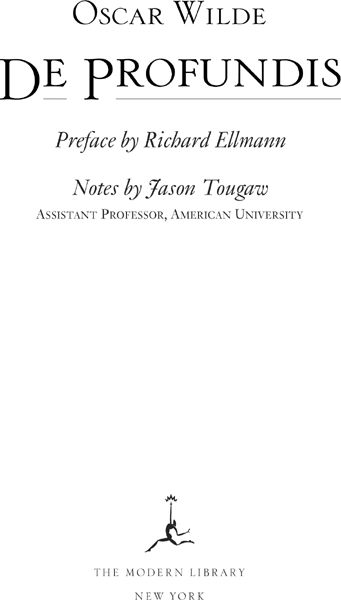De Profundis

Oscar Wilde
Oscar Wilde was born in Dublin in 1854. His father was a celebrated surgeon, his mother a supporter of Irish independence who presided over literary salons in Ireland and England. Although his brilliance as a classicist at Dublin’s Trinity College won him a scholarship to Magdalen College, Oxford, Wilde failed in his attempts at an academic career. Instead he set his sights on the literary and artistic worlds of London. Fusing the influences of Ruskin, the Pre-Raphaelites, Walter Pater, and Gautier’s l’art pour l’art, he made himself the most visible manifestation of the Aesthetic movement; by 1881 a burlesque of Wilde provided the protagonist for the Gilbert and Sullivan operetta Patience. It was to exploit the popularity of the operetta, in fact, that the producer D’Oyly Carte underwrote Wilde’s immensely successful lecture tour of America. Married in 1884 to Constance Lloyd, Wilde worked briefly as a magazine editor while publishing poetry, plays, fairy tales, and essays.
The Picture of Dorian Gray was commissioned by J. M. Stoddardt, the Philadelphia publisher of Lippincott’s Monthly Magazine. It appeared in the July 1890 issue and immediately gained a certain notoriety for being “mawkish and nauseous,” “unclean,” “effeminate,” and “contaminating.” When it was published as a book the following year, Wilde greatly revised and expanded the text, filling it out with a melodramatic subplot and adding a preface that defended his aesthetic philosophy. As for the book’s value as autobiography, Wilde noted in a letter that the main characters are in different ways reflections of him: “Basil Hallward is what I think I am; Lord Henry what the world thinks me; Dorian what I would like to be—in other ages, perhaps.”
In the early nineties, Wilde was at the center of an artistic milieu characterized by The Yellow Book, the Rhymers’ Club, and the art of Aubrey Beardsley. He wrote a poetic drama, Salomé, in French (1892), but it was banned in England; the play was published in book form with illustrations by Beardsley in 1894. Salomé was produced in Paris in 1896.
However, Wilde did achieve success as a popular playwright, writing in rapid succession Lady Windermere’s Fan, A Woman of No Importance, An Ideal Husband, and The Importance of Being Earnest. In 1895, two of his plays were on the London stage simultaneously, and he was acknowledged as a pivotal figure in English literary life, admired for his wit and eloquence.
Since at least the mid-1880s, Wilde had lived a sexual double life, and in 1893 he distanced himself from his family by taking rooms at the Savoy Hotel. He had by then embarked on a passionate relationship with the considerably younger Lord Alfred Douglas, the English translator of Salomé whom he had met the year after he wrote The Picture of Dorian Gray. In March 1895, Wilde undertook a libel action against the Marquis of Queensberry, Lord Alfred’s father, who had denounced Wilde as a “somdomite” [sic]. Wilde withdrew the suit following damaging cross-examination by the marquis’s defense attorney, a former classmate of Wilde’s. (Question: “Have you ever adored a young man madly?” Answer: “I have never given adoration to anybody except myself.”) Shortly thereafter, Wilde was arrested for homosexual offenses and underwent two trials before being sentenced to hard labor at Wandsworth Prison and Reading Gaol. A long recriminatory letter to Douglas written while in prison was eventually published as De Profundis.
Released in 1897, Wilde left for France, calling himself Sebastian Melmoth, a name taken from the gothic novel Melmoth the Wanderer, written by Wilde’s great-uncle. A poem based on his prison experience, The Ballad of Reading Gaol, was published in 1898.
His health destroyed, and bankrupted by legal expenses, Wilde lived in Paris for three years, making a conversion to Roman Catholicism just before his death in November 1900. He is buried in the cemetery of Père Lachaise.
CONTENTS
PREFACE BY RICHARD ELLMANN
DE PROFUNDIS
NOTES
COMMENTARY
READING GROUP GUIDE FOR DE PROFUNDIS
Preface
by Richard Ellmann
De Profundis is a kind of dramatic monologue, which constantly questions and takes into account the silent recipient’s supposed responses. Given the place where it was written, Wilde might have been expected to confess his guilt. Instead he refuses to admit that his past conduct with young men was guilty, and declares that the laws by which he was condemned were unjust. * The closest he comes to the subject of homosexuality is to say, impenitently, that what the paradox was for him in the realm of thought, sexual deviation was in the realm of conduct. More than half of De Profundis is taken up by his confession, not of his own sins, but of Bosie’s. He evokes two striking images for that young man. One is his favorite passage from Agamemnon, about bringing up a lion’s whelp inside one’s house only to have it run amok. Aeschylus compared it to Helen, Wilde to Douglas. The other is Rosencrantz and Guildenstern, who have no realization of Hamlet’s tragedy, being “the little cups that can hold so much and no more.”
The main theme of self-recrimination is that he did not break with Bosie. But his letter is an attempt to restore relations. And while he admits to “weakness,” he explains the weakness as due to his affection, good nature, aversion to scenes, incapacity to bear resentment, and desire to keep life comely by ignoring what he considered trifles.
1 comment